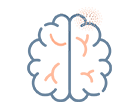Spinocerebellar Ataxia Precision Panel
Spinocerebellar Ataxia (SCA) refers to a heterogeneous group of progressive neurodegenerative diseases of genetic origin. Currently, more than 30 types have been described, most of which are autosomal dominant. Classification is done according to the clinical manifestations or genetic nosology.




